|

|
|
Young Vermonters Share Their Vision for Future of Our Country |
|
Dear Fellow Vermonter,
At a time of anxiety about a lot of things, I wanted to share some very good news with you.
This Saturday, at the State House, I had a round table discussion with 13 high school students who were finalists in our annual State of the Union essay contest. We had nine independent judges read through the 475 essays that were submitted from 25 schools throughout the state, and they determined that these were the best.
The essays covered virtually every major challenge facing our country and provided very thoughtful solutions. They were well written and each of the students defended them extremely well in our discussions. All of these essays have been printed in the Congressional Record so that they will be there for posterity.
|
|
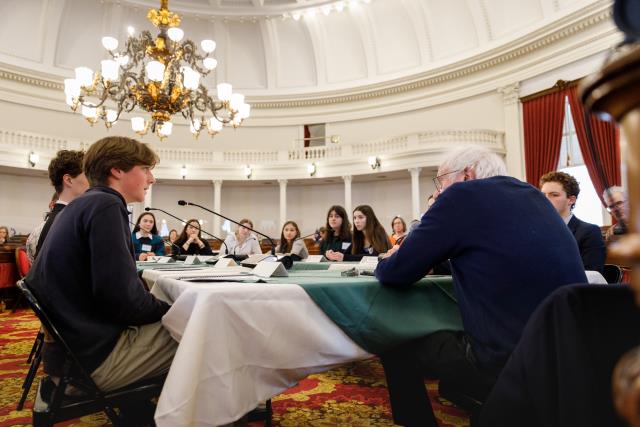
|
|
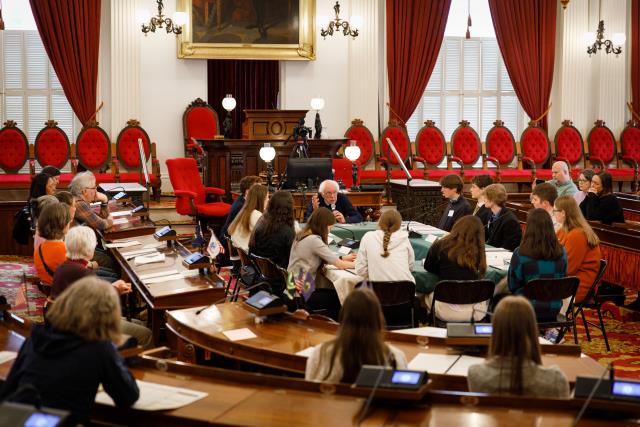
|
|
These kinds of conversations truly give me hope, as there is no doubt that this generation of young people is paying attention and thinking of ways to be involved in their communities and helping to shape the future of our country.
Please take some time read these students’ essays, which were published in the Congressional Record. The top three winning essays are below and you can read all of the finalists’ essays here.
You can also watch a video recording of the event here.
The list of three winners and 12 finalists are:
- Justason “J” Lahue, First Place Winner of Burr and Burton Academy
- Ari Glasser, Second Place Winner of Essex High School
- Ely White, Third Place Winner of Leland and Gray Union Middle High School
- Leo Beebe, Finalist of Winooski High School
- Emilee Brownell, Finalist of Essex High School
- Sofia Bush, Finalist of Mount Mansfield Union High School
- Aleks Cirovic, Finalist of Woodstock Union High School
- Allie Hamilton, Finalist of Mount Mansfield Union High School
- Mia Konefal, Finalist of South Burlington High School
- Hazel O’Brien, Finalist of Twinfield Union School
- Mackenzie Russell, Finalist of Harwood Union High School
- Hannah Smiley, Finalist of Milton High School
- Winslow Solomon, Finalist of Vermont Commons School
- Owen Stygles, Finalist of Bellows Free Academy Fairfax
- Amy Vaughan, Finalist of Oxbow High School
Thank you to all the students who participated, to the teachers who encouraged them, and to our judges. I look forward to next year’s contest!
Sincerely,
 |
|
First Place: Justason Lahue
Junior, Burr and Burton Academy |
|
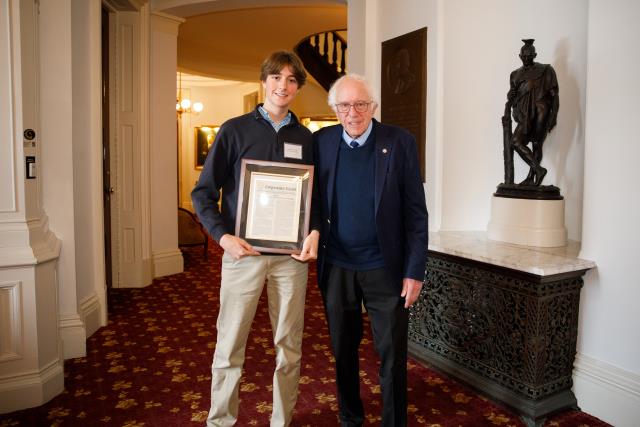
|
|
Social media is deteriorating adolescent mental health, yet the United States' government is treating the situation like a social experiment; our government is waiting to see what will happen despite the mounting evidence that social media has dangerous effects. Until we apply evidence based regulations to limit social media use, adolescent well-being is in jeopardy.
The current evidence of harm is compelling. A 2023 Gallup survey found that teenagers spend an average of 4.8 hours on social media daily. Alarmingly, a longitudinal study involving 6,595 adolescents revealed that spending over 3 hours daily on social media doubled the risk of poor mental health outcomes, such as anxiety and depression. These are not studies in isolation: a systematic review of 13 studies also found that unhealthy engagement of social media was correlated with depression, anxiety, and psychological distress.
While these studies demonstrate correlation, there are also indicators of causality. Numerous studies highlight how limiting social media use can improve mental health. A randomized controlled trial reported that reducing social media use by just 30 minutes daily lessened depressive symptoms in college students. Another study involving adolescents showed that ceasing social media use for 4 weeks resulted in a 25-40% improvement in subjective well-being (e.g., life satisfaction, depression, and anxiety) when compared to psychological interventions such as therapy.
Social media use can worsen adolescent mental health, while lessening use demonstrates the opposite effect. Adolescent brain development is most active from ages 10 to 14. However, the arbitrary and rarely enforced 'internet age' currently set at 13 exposes immature brains to a world of entertainment, inappropriate content, and harassment. Given these biological factors and the evidence of potential harm, a more appropriate age for adolescents to access the internet is 16 years of age.
I propose a bill called the Youth Mental Health Protection Act. This act would target a root cause of social media-related youth mental health issues by changing the legal age of 'internet adulthood' (i.e., when one can sign up for most online platforms, consent to terms of service, and share personal data). This act would make 16 the legally required age to access social media, similar to obtaining a driver's license in most states, another privilege requiring complex thinking and decision-making. Finally, the Youth Mental Health Protection Act would hold social media companies liable by requiring age verification prior to account creation.
Requiring age checks would likely lessen the negative effects of social media on adolescent mental health, however, this is just one step the United States government needs to take to solve this crisis. To counteract the harms introduced by this ongoing social experiment, policy-makers need to act now. Enacting the Youth Mental Health Protection Act and prioritizing further research on the effects of social media is imperative to safeguard the mental health of our nation's youth.
|
Second Place: Ari Glasser
Junior, Essex High School |
|
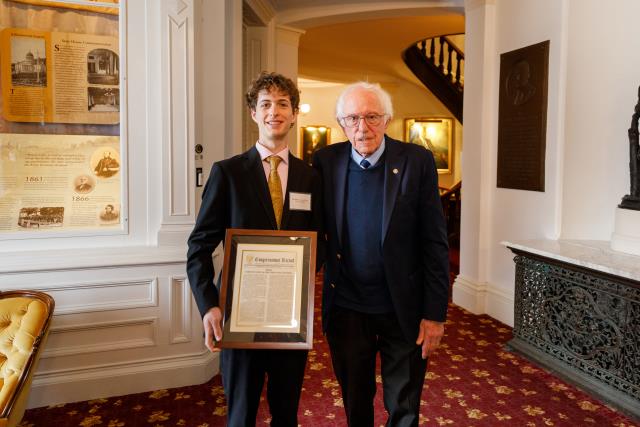
|
|
President-elect Donald Trump has so far nominated over a dozen billionaires to his cabinet, with a combined net worth of over $400 billion-more than ten times the GDP of the state of Vermont. In addition, Elon Musk, the richest man in the world, was one of Trump's strongest supporters during the election campaign: He donated a staggering $277 million to Trump and other Republican candidates, according to CBS News. It is clear that the ultra-wealthy control a growing share of both political and economic power in the United States, holding disproportionate sway that erodes the power of the American people. The expanding influence of the billionaire class is one of the greatest challenges facing America today.
The recent trend of billionaire influence is reminiscent of the Gilded Age, a time when an incredibly wealthy group of industrialists such as John D. Rockefeller presided over vast monopolies while the government struggled to break them up. Meanwhile, the urban masses worked long hours with deplorable conditions and little pay. It was a kind of oligarchic society, one where these "Captains of Industry" wielded immense political and economic influence. Today, America is in a sort of Second Gilded Age-complete with drastic wealth inequality and a dangerous level of influence by the ultrawealthy that is becoming ever nearer to oligarchy. Just 735 billionaires hold more wealth than the bottom half of all American households.
In order to reduce the concerning level of billionaire influence, many reforms must be enacted, but perhaps most important is a wealth tax. This could raise trillions of dollars for the government while also reducing the wealth and influence of billionaires over time. One such proposal would be Senator Bernie Sanders' plan, which would implement a progressive wealth tax, starting at one percent on net worth over $32 million, up to eight percent on net worth over $10 billion. According to Sanders, this plan would cut in half the wealth of billionaires over just 15 years, greatly reducing wealth inequality and the power of the top 0.1 percent.
In addition to reducing the economic power of billionaires, their political influence must be reduced through the use of campaign finance reform-most importantly, overturning the 2010 Supreme Court decision in Citizens United v. FEC. This case eviscerated campaign finance regulations and essentially allowed unlimited contributions to political groups known as super PACs, such as the one Elon Musk donated to. While it may be difficult, passing a proposal such as the We the People Amendment would reverse the Citizens United decision by putting an end to the antidemocratic concepts that money equals political speech, and that corporations are people.
While there is no simple solution to ending the dangerous influence of billionaires in American politics and the economy, through important legislative action such as a wealth tax and campaign finance reform, America can stop the encroachment of oligarchy on its society.
|
Third Place: Ely White
Senior, Leland and Gray Union Middle High School |
|
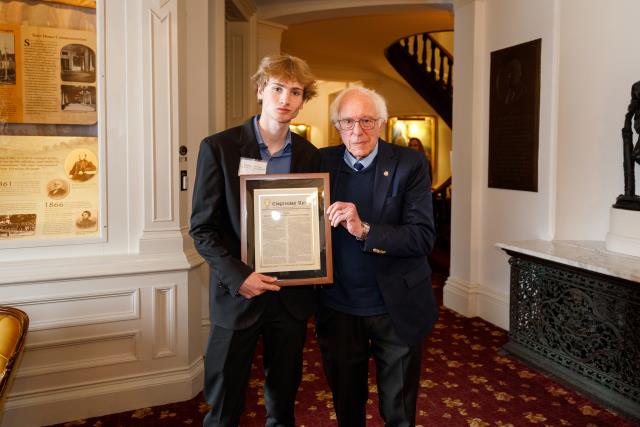
|
|
Abraham Lincoln once said, "a house divided against itself cannot stand." Speaking solemnly of the dire state of division in the United States leading up to the Civil War, it is now over a century later that his words resonate once more.
Political polarization has grown in the past decade in the United States, transforming healthy debates of ideas into an endless battle of "us" against "them." Division has infiltrated into all facets of American life, a political landscape where compromise is rare and partisan loyalty is prioritized. This deepening division threatens the ideals of our democracy, making it nearly impossible to address the critical issues that face our country today.
A 2022 NBC News survey revealed that 80% of Americans believe the opposing party "poses a threat that, if not stopped, will destroy America." This growing divide is evident in the 2018-19 government shutdown, when a standoff between Democrats and Republicans over border wall funding caused a 35-day gridlock. With neither side willing to compromise, 800,000 government workers went unpaid, and federal services became disrupted. Heightened polarization has normalized the prioritization of party loyalty over national needs, a theme of officials refusing to seek bi-partisan solutions even with critical federal services, workers, and decisions at stake. Beyond our boardrooms and capitals, division based on political views has become synonymous with what it means to be American. Pew Research Center's 2022 report on polarization shows that 72% of Republicans view Democrats as more immoral than other Americans, and 62% of Democrats say the same about Republicans. Political identity has become tribal in nature, a defining characteristic of one's morality and values. Political polarization strains relationships in families, communities, and workplaces, the American Psychological Association reporting that 38% of adults avoided conversations with people of opposing political views.
Addressing solutions to America's political division is complex. Specific systemic reforms, however, can help reduce polarization by shifting the incentives that drive division. Ranked-choice voting (RCV) is a system that allows voters to rank candidates in order of preference, the votes for the lowest-ranking candidate then redistributed to voters' next choice until a majority is achieved. RCV would encourage candidates to appeal to broader ranges of voters rather than just their base, incentivizing politicians to take moderate stances rather than extreme party-driven positions. Reforming the closed primary system by adopting open or top-two systems would force candidates to appeal to a broader electorate, reducing the influence of extreme partisanship and encouraging more moderation. Integrating civic education and media literacy into our schools and communities could also work as a grassroots solution in helping individuals evaluate information and recognize bias in misinformation and ideological chambers.
The future of our democracy depends on our ability to bridge divides and prioritize unity over partisanship. We must rebuild trust, restore faith in our institutions, and create a government that serves all Americans. Change begins with us- and we call and act for a system that brings us together, not tears us apart.
|
How Can We Help?
My Vermont offices have experienced caseworkers on staff who help Vermonters navigate federal agencies every day. If you think my office can help, please do not hesitate to call 1-800-339-9834 or click here.
If you would like to share your thoughts on pending legislation, or if you have an idea that we could address through new legislation, click here.
Receiving this email as a forward? Click here to sign up for the Bernie Buzz. |
|
|
|
|
 
|
|